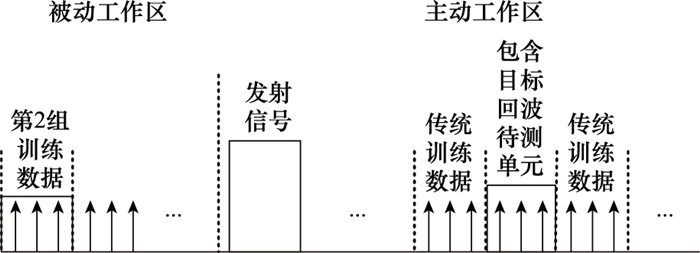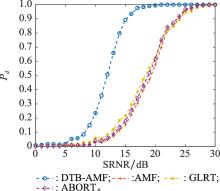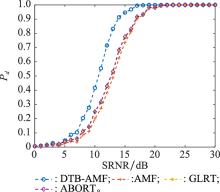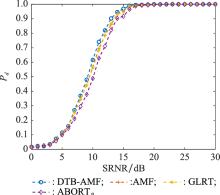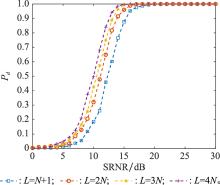| 1 |
YAN L , PIAO S C , XU F . Orthogonal waveform separation in multiple-input and multiple-output imaging sonar with fractional Fourier filtering[J]. IET Radar, Sonar & Navigation, 2021, 15 (5): 471- 484.
|
| 2 |
KERSTENS R , JANSEN W , STECKEL J . Radial velocity estimation for multiple objects using in-air sonar with MIMO virtual arrays[J]. IEEE Access, 2023, 11, 16700- 16710.
|
| 3 |
周飞, 俞健. 基于加权循环算法的高分辨成像波形设计[J]. 舰船科学技术, 2024, 46 (10): 126- 131.
|
|
ZHOU F , YU J . High resolution imaging waveform design based on weighted cycle algorithm[J]. Ship Science and Technology, 2024, 46 (10): 126- 131.
|
| 4 |
刘伟烨, 杨益新, 刘雄厚. 基于相关干扰抑制的MIMO声呐波形设计[J]. 哈尔滨工程大学学报, 2023, 44 (9): 1510- 1518.
|
|
LIU W Y , YANG Y X , LIU X H . MIMO sonar waveform design based on correlation interference suppression[J]. Journal of Harbin Engineering University, 2023, 44 (9): 1510- 1518.
|
| 5 |
HAIMOVICH A M , BLUM R S , CIMINI L J . MIMO radar with widely separated antennas[J]. IEEE Signal Processing Magazine, 2008, 25 (1): 116- 129.
|
| 6 |
LI J , STOICA P . MIMO radar with colocated antennas[J]. IEEE Signal Processing Magazine, 2007, 24 (5): 106- 114.
|
| 7 |
陈世进, 闫晟, 郝程鹏, 等. 一种适用于多输入多输出声呐的稳健空时自适应检测方法[J]. 声学学报, 2022, 47 (6): 777- 788.
|
|
CHEN S J , YAN S , HAO C P , et al. A robust space-time adaptive detection method for multiple-input multiple-output sonar[J]. Acta Acustica, 2022, 47 (6): 777- 788.
|
| 8 |
CHENG Z Y , HE Z S , WANG Z L , et al. Detection performance analysis for distributed MIMO radar[J]. Journal of Radars, 2017, 6 (1): 81- 89.
|
| 9 |
YU X X , YAO X , YANG J , et al. Integrated waveform design for MIMO radar and communication via spatio-spectral modula tion[J]. IEEE Trans.on Signal Processing, 2022, 70, 2293- 2305.
|
| 10 |
XU F , MORENCY M W , VOROBYOV S A . DOA estimation for transmit beamspace MIMO radar via tensor decomposition with Vandermonde factor matrix[J]. IEEE Trans.on Signal Processing, 2022, 70, 2901- 2917.
|
| 11 |
WU Z X , ZHU S Q , XU J W , et al. Interference suppression method with MR-FDA-MIMO radar[J]. IEEE Trans.on Aerospace and Electronic Systems, 2023, 59 (5): 6250- 6264.
|
| 12 |
LIU J , ZHOU S H , LIU W J , et al. Tunable adaptive detection in colocated MIMO radar[J]. IEEE Trans.on Signal Processing, 2018, 66 (4): 1080- 1092.
|
| 13 |
黄广佳, 程旭, 饶彬, 等. 基于广义Rao检验的单/多比特MIMO雷达运动目标检测方法[J]. 系统工程与电子技术, 2023, 46 (1): 105- 112.
doi: 10.12305/j.issn.1001-506X.2024.01.12
|
|
HUANG G J , CHENG X , RAO B , et al. One/multi-bit MIMO radar detection of a moving target based on generalized Rao test[J]. Systems Engineering and Electronics, 2023, 46 (1): 105- 112.
doi: 10.12305/j.issn.1001-506X.2024.01.12
|
| 14 |
张顺生, 李鑫, 黄栎冰, 等. 距离角度失配条件下的FDA-MIMO雷达运动目标检测算法[J]. 信号处理, 2024, 40 (1): 197- 206.
|
|
ZHANG S S , LI X , HUANG L B , et al. Moving target detection algorithm for FDA-MIMO radar under range angle mismat ch conditions[J]. Journal of Signal Processing, 2024, 40 (1): 197- 206.
|
| 15 |
WANG P , LI H B . Target detection with imperfect waveform separation in distributed MIMO radar[J]. IEEE Trans.on Signal Processing, 2020, 68, 793- 807.
|
| 16 |
ZENG C C , WANG F Z , LI H B , et al. Target detection for distributed MIMO radar with nonorthogonal waveforms in cluttered environ-ments[J]. IEEE Trans.on Aerospace and Electronic Systems, 2023, 59 (5): 5448- 5459.
|
| 17 |
ZHU J J , ZHU S Q , XU J W , et al. Simultaneous detection and discrimination of mainlobe deceptive jammers in FDA-MIMO radar[J]. IEEE Trans.on Aerospace and Electronic Systems, 2023, 59 (6): 7499- 7513.
|
| 18 |
LIU J , HAN J W , LIU W J , et al. Persymmetric Rao test for MIMO radar in Gaussian disturbance[J]. Signal Processing, 2019, 165, 30- 36.
|
| 19 |
GUAN J , MU X Q , HUANG Y , et al. Space-time-waveform joint adaptive detection for MIMO radar[J]. IEEE Signal Processing Letters, 2023, 30, 1807- 1811.
|
| 20 |
HU Z Y , WANG W , DONG F Y . A low-complexity MIMO radar STAP strategy for efficient sea clutter suppression[J]. IEEE Geoscience and Remote Sensing Letters, 2022, 19, 4024105.
|
| 21 |
WU M , HAO C P , HU Q , et al. Sparsity-based processing to enhance the reverberation suppression for FDA-MIMO sonars[J]. IEEE Trans.on Aerospace and Electronic Systems, 2024, 60 (2): 1556- 1569.
|
| 22 |
DE MAIO A , FARINA A , FOGLIA G . Knowledge-aided Bayesian radar detectors and their application to live data[J]. IEEE Trans.on Aerospace and Electronic Systems, 2010, 46 (1): 170- 183.
|
| 23 |
HAO C P , SHANG X Q , BANDIERA F , et al. Bayesian radar detection with orthogonal rejection[J]. IEICE Trans.on Fundamentals of Electronics Communications and Computer Sciences, 2012, 95-A (2): 596- 599.
|
| 24 |
GAO Y C , LI H B , HIMED B . Knowledge-aided range-spread target detection for distributed MIMO radar in nonhomogeneous environments[J]. IEEE Trans.on Signal Processing, 2017, 65 (3): 617- 627.
|
| 25 |
LIU J , HAN J W , ZHANG Z J , et al. Bayesian detection for MIMO radar in Gaussian clutter[J]. IEEE Trans.on Signal Processing, 2018, 66 (24): 6549- 6559.
|
| 26 |
HAN J W , ZHANG Z J , LIU J , et al. Adaptive Bayesian detection for MIMO radar in Gaussian clutter[J]. Journal of Radars, 2019, 8 (4): 501- 509.
|
| 27 |
YIN C R , HAO C P , ORLANDO D , et al. Learning strategies for the interference covariance structure based on a Bayesian approach[J]. IEEE Signal Processing Letters, 2022, 29, 1182- 1186.
|
| 28 |
LI P , HUANG B , WANG W Q . Knowledge-aided Bayesian detection of distributed target for FDA-MIMO radar in Gaussian clutter[J]. IEEE Trans.on Radar Systems, 2021, 2, 344- 354.
|
| 29 |
郝程鹏, 闫晟, 张宇轩. 主动声呐空时自适应处理技术[M]. 北京: 科学出版社, 2023.
|
|
HAO C P , YAN S , ZHANG Y X . Space-time adaptive processing technology for active sonar[M]. Beijing: Science Press, 2023.
|
| 30 |
殷超然. 主动声呐混响背景分类与自适应目标检测算法研究[D]. 北京: 中国科学院大学, 2023.
|
|
YIN C R. Research on reverberation background classification and adaptive target detection of active sonar systems[D]. Beijing: University of Chinese Academy of Sciences, 2023.
|
| 31 |
YAN L J , ADDABBO P , HAO C P , et al. New ECCM techniques against noiselike and/or coherent interferers[J]. IEEE Trans.on Aerospace and Electronic Systems, 2020, 56 (2): 1172- 1188.
|
| 32 |
YAN L J , ADDABBO P , ZHANG Y X , et al. A sparse learning approach to the detection of multiple noise-like jammers[J]. IEEE Trans.on Aerospace and Electronic Systems, 2020, 56 (6): 4367- 4383.
|
| 33 |
YAN L J , HAO C P , ORLANDO D , et al. Parametric space-time detection and range estimation of point-like targets in partially homogeneous environment[J]. IEEE Trans.on Aerospace and Electronic Systems, 2020, 56 (20): 1228- 1242.
|

